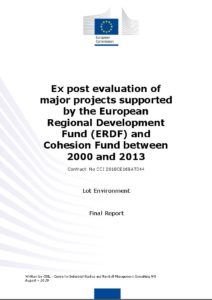
The study addresses five criteria (project relevance, coherence, effectiveness, efficiency and EU added value) through consistent use of retrospective CBA and qualitative analysis. Field visits and an extensive interview plan allowed the authors to collect primary data and the views and perceptions of a broad range of stakeholders (with a total of 217 people interviewed). A stakeholder seminar (with 42 participants) was an integral part of the methodology and aimed at discussing the preliminary evidence stemming from the ten case studies.
Findings have shown that environmental major projects contribute to the Cohesion policy’s core goals by supporting economic growth and competitiveness and protecting and improving the environment. They also contribute to increasing compliance with the EU environmental acquis. Cohesion policy strengthens administrative capacity on environmental legal, and institutional matters through major projects, particularly employing technical support. Forecasting capacity of future demand emerged as a problematic determinant of project performance, especially in its impact on project design and ultimately on effectiveness and efficiency.